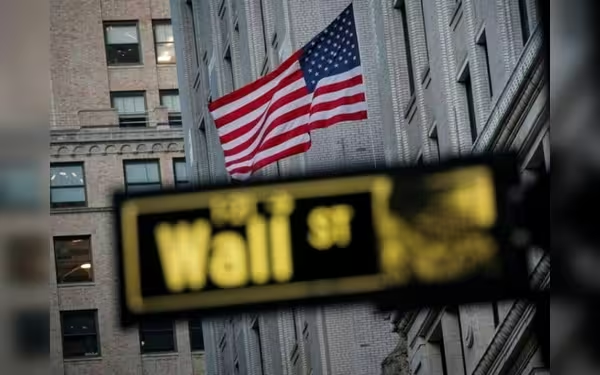Thursday, November 7, 2024 03:22 AM
Wall Street Declines as Microsoft and Meta Warn of AI Costs
- Wall Street faces downturn due to AI cost concerns.
- Meta and Microsoft report disappointing AI expenditure guidance.
- Tech stocks experience significant declines amid rising expenses.
 Image Credits: brecorder
Image Credits: brecorderWall Street declines as Microsoft and Meta warn of rising AI costs, impacting investor sentiment and tech stock valuations.
Wall Street experienced a significant downturn on Thursday, primarily driven by alarming warnings from tech giants Microsoft and Meta Platforms regarding rising costs associated with artificial intelligence (AI). This news has dampened the enthusiasm that investors had for large-cap stocks, which have been the backbone of the market rally throughout this year.
Shares of Meta Platforms, the parent company of Facebook, saw a decline of 4%, while Microsoft’s stock fell by 5.6%. This drop occurred despite both companies reporting earnings that exceeded analysts' expectations in their quarterly results released after the market closed on Wednesday. Quincy Krosby, the chief global strategist for LPL Financial, noted, "The market, overall, has been disappointed with mega tech guidance, especially with regard to Meta’s AI expenditures as well as slower-than-anticipated integration of AI into Microsoft’s cloud platform." This sentiment reflects a growing concern among investors about the sustainability of profits in the face of increasing AI-related expenses.
Adding to the market's woes, the yield on the benchmark 10-year Treasury note rose above 4.3%, which further pressured equity prices. The Personal Consumption Expenditures (PCE) price index, a key measure of inflation favored by the Federal Reserve, increased by 0.2% in September, aligning with economists' expectations. However, the core PCE figure rose to 2.7% year-over-year, slightly above the anticipated 2.6%. Consumer spending also showed a modest increase, which led traders to maintain their bets on a 25-basis-point rate reduction in the Federal Reserve's upcoming November meeting. Bret Kenwell, an investment analyst at eToro, commented, "Despite some stickiness to core PCE measures, overall PCE continues to trend lower… while December’s (Federal Reserve) rate cut may not be such a certainty, a rate cut in November is firmly on the table."
Both Microsoft and Meta have indicated that their capital expenses are rising due to investments in AI, which could potentially impact their profitability. This is particularly concerning for investors who are looking for quick returns on the substantial amounts of money already invested in these technologies. Other major tech stocks, often referred to as the "Magnificent Seven," also faced declines, with Amazon.com dropping 3.4% and Apple falling 1.4% ahead of their quarterly results, which are expected after the market closes.
While the excitement surrounding AI-driven technology stocks has propelled Wall Street to record highs this year, the current market conditions reveal that stocks are trading at exceptionally high valuations. The warnings from Meta and Microsoft highlight the challenges that these companies face in meeting investor expectations. The Dow Jones Industrial Average fell by 355.91 points, or 0.84%, closing at 41,785.63. The S&P 500 lost 92.83 points, or 1.60%, ending at 5,720.84, while the Nasdaq Composite dropped 464.96 points, or 2.50%, to close at 18,142.97. The Information Technology sector was particularly hard hit, slumping 3.3%, marking its worst day since early September.
In contrast, positive earnings from ConocoPhillips and Entergy provided a boost to the Energy and Utilities sectors. However, an index of chip stocks fell by 4.3%, led by an 18.2% loss in Monolithic Power Systems following its earnings report. The losses experienced on this day have put all three major indexes on track for monthly declines. The VIX, often referred to as Wall Street’s "fear gauge," reached its highest level since early September, as investors brace for increased volatility stemming from corporate earnings reports, the upcoming U.S. presidential election, and the Federal Reserve's November meeting.
In other notable market movements, Estee Lauder's shares plummeted by 19.6%, marking its worst day on record, after the cosmetics company withdrew its annual forecasts for 2025. Similarly, shares of Uber Technologies fell by 11.7% after the company projected fourth-quarter gross bookings that fell short of expectations. On the New York Stock Exchange, declining issues outnumbered advancers by a ratio of 2.8-to-1, while on the Nasdaq, the ratio was 3.08-to-1. The S&P 500 recorded 23 new 52-week highs and six new lows, while the Nasdaq Composite noted 47 new highs and 120 new lows.
The recent downturn in Wall Street serves as a stark reminder of the volatility that can accompany the tech sector, particularly in the face of rising costs and investor expectations. As companies like Microsoft and Meta navigate the challenges posed by AI investments, it will be crucial for investors to remain vigilant and informed. Understanding the dynamics of the market and the implications of corporate earnings can help investors make more informed decisions in these uncertain times.













